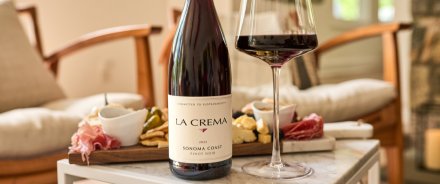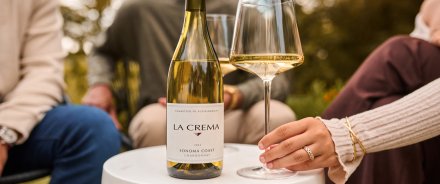Our commitment to sustainability
Here at La Crema, we’ve been implementing sustainable practices well before it was the “cool” thing to do. We’ve got Mother Nature to thank for the lovely grapes that make our premium, oh-so-delicious, wines, and we believe it’s our role to take care of her in return.
Now we are pulling back the curtain for our fans and showing you the green magic that happens backstage. Our goal is to always leave behind tiny environmental footprints while crafting our delectable wines. See below how we go (and do) green in our vineyards and cellar.
Cheers to being eco-chic!
Nature-Based Wine Growing
Why intervene with something that already has its own rhythm? Or, to say it in the more popular, colloquial phrase, “if it ain’t broke, don’t fix it.”
That is what nature-based winegrowing is. We look at what nature already does to support the growth of plants and then recreate it with eco-friendly protocols.
Biodiversity
Biodiversity is a word for all living organisms co-existing within a single area. Animals, plants, and even bacteria all work together to make a positive impact on the ecosystem. We use those native organisms to help support vine growth and protect our vineyards. This strategy also protects the existing biodiversity of our lands.
Land Preservation
Just because we have the land doesn’t mean we plant vineyards on it. In fact, 60% of our estate vineyard properties are left unplanted. This allows the natural habitats to thrive and helps our vines become part of the land’s biodiversity system. Together they create a harmony that helps the ecosystem flourish.
Regenerative Farming
Regenerative farming improves soil health by moving some of the excess carbon from our atmosphere (where it’s not needed) into our soils (where it is needed). The carbon within soil is rich in nutrients, can hold water better, creates an environment for favorable microorganisms to populate… we could continue reciting the numerous benefits in this list, but let’s take this as an opportunity to segway into more specific details.
Regenerative Farming Techniques
At the heart of regenerative farming is a commitment to nurturing the land for the long term. This approach strengthens ecosystems, enhances soil vitality, and creates conditions that support plant and microbial health. Each vineyard site presents its own unique challenges, requiring a tailored strategy to optimize productivity and minimize environmental impact. By focusing on biodiversity and soil regeneration, we create more resilient vineyards that thrive naturally over time. We continuously evolve our practices to reduce inputs, conserve water, and improve soil health, ensuring that the land remains fertile for future generations. Through these sustainable methods, we produce high-quality yields that benefit both the environment and the local community, fostering a balanced and lasting connection to the land.
Compost
Compost keeps the soil healthy by increasing organic matter, keeping the soil fertile, increasing water holding, and regulating soil density. We collaborate with several third-party agencies that measure our soil health and ensure our compost application is benefiting our vineyards (spoiler alert: it does!)
Once a grape has been crushed, what remains is a pulpy substance that isn’t used in the wine called pomace. Instead of throwing out our pomace (where it would waste away in a landfill and create greenhouse gases), we use that pomace in our compost where it provides nutrients for our soil. Food trimming and manure from neighboring farms are also added to our compost. We divert as much as 99% of our organic waste from landfills.
A stat like that would usually prompt a mic drop, but it’s too early for that kind of showmanship in this blog since there are many more impressive stats to come.
Compost Tea
Compost tea is exactly what it sounds like: it’s water that was steeped with compost. Once the compost is removed, the remaining water (or tea) is loaded with nutrients and healthy microorganisms. We then let our vineyards have a little tea party by spraying them with the nutrient-dense water and by adding it to our irrigation system.
Cover Crops
If you’ve ever driven through Sonoma during the fall season, you’ve probably seen the rows of mustard flowers throughout the vineyards. These are cover crops. They can help limit weed growth, prevent soil erosion, maintain moisture, and attract pollinators like honeybees and butterflies. Not to mention, they also make great instagrammable moments. If you plan your photo op around sunset, your followers will absolutely swoon!
Livestock
Even sheep and chickens can enjoy a little romantic snack while overlooking the views of our gorgeous estate. These friends of the farm graze on our unwanted weeds, nibble on our excess cover crops, and provide a natural, straight from the source, fertilizer. The chickens also help aid in insect population control since they enjoy a fine-dining experience of grubs and beetles. When they search for their feast, they claw at our soil which helps it loosen and aerate.
Ecosystem Management
Raptors, owls, and falcons. Oh my! We encourage these birds of prey to make our estate their home with nesting boxes. The nesting boxes provide safe shelters for the birds to raise their young. They also just so happen to be placed in convenient and strategic locations for them to hunt rodents that wreak havoc on our vineyards. See if you can spot these heroes of the vineyard next time you visit our estate.
Water Conservation
Let’s play two truths and no lie: 1. California is usually in a drought. 2. We need water to make wine. So how do we reduce our water usage and still save water for later? We’re so happy you asked:
Rainwater Capture
Untreated, glorious, straight from the sky water! Also known as rainwater. But before we break down why rainwater is the best water, let’s have a quick chat about groundwater. Groundwater is treated to get rid of harmful microorganisms. This is why you don’t get sick when you drink it. That’s a good thing, right? It is. The issue is that the treatments can create an excess of minerals and those minerals can have less favorable effects on the soil compared to rainwater.
Now let’s chat the benefits of rainwater. It is free from treatment chemicals, has a higher pH (that plants love), and has nitrates. Nitrates are made up of oxygen and nitrogen and the nitrates in rainwater can be more easily absorbed by plants.
Since California is in a drought most years, we’ve installed a rainwater capture system. That way we can collect and save rainwater for a later use. This year alone we’ve collected over 80,000 gallons of rainwater.
Another would-be mic drop statistic, but we still have more to discuss.
Use Every Drop Twice
The water we use in the cellar isn’t discarded. Instead, we collect the water after it is used and then reuse that collection in the vineyards. If you happen to reside in a drought-ridden area, you can also do this at home. You can collect water while you shower or while you wash dishes and use it for your outdoor, non-edible plants. Most compost and soils should be able to filter out the water.
High-Capacity Soil
With all the regenerative farming techniques we use to create healthy soil, that healthier soil can hold onto water longer. Besides creating a happy biodiversity environment, this enables us to use drip irrigation which minimizes our water use.
Energy Efficient
Our goal is to minimize our reliance on the grid because it benefits our energy usage, our output, and our surrounding community. As technology advances and becomes more energy efficient, so will our systems.
Central Computer
All facilities are managed by a central computer. We use this computer to monitor the energy usage of lighting, boilers, and refrigeration. With this monitoring system, we can effortlessly make adjustments as needed and ensure we optimize our efficiency.
Solar Power
Our winery is powered by 3,000 solar panels. We also conserve the energy we’ve gathered from the sun by installing Tesla stationary batteries to store excess power. Every year our solar generates over 1 GWh of clean, renewable energy. That’s enough to offset 70% of our winery electricity usage each year.
Still not yet.
Certifications
For us, it was important we don’t just say we’re sustainable, but we show we’re sustainable. We went through a few rigorous third-party certification processes to formalize and validate our sustainable initiatives. Now you don’t have to just take our word for it. You can take their word for it:
Sustainability in Practice (SIP) Certification
All of La Crema’s estate vineyards have been certified under the SIP program. The strict standards of the SIP certification address what they call the three P’s of sustainability: People, Planet, and Prosperity. The certification has a measurable strategy to ensure natural and human resources are protected. This includes strict environmental standards like water management and preserving space, but it also includes high standards of business practices like providing competitive wages and education opportunities for employees.
Sustainable Winegrowing Practices
The Sustainable Winegrowing Alliance is a non-profit organization with a commitment to promoting sustainable winegrowing practices. La Crema met all the 227 requirements for the vineyard certification. And the winery facility also has a separate certification under the Sustainable Winegrowing Alliance’s program.
Still too soon to mic drop.
For Future Generations
Our efforts don’t stop here. In 2020 we implemented a 10-year roadmap to reduce our carbon footprint even further. By 2030 we will cut carbon emissions in half, deploy more water conservation practices, and enhance our local watersheds. We also know we can’t do any of this without our team or our community which is why we will continue to invest in our people to maintain their health and safety and help them achieve their education and career goals. We know we’re dependent on the land —not the other way around—so we’re all about protecting the land that surrounds us and ensure we create a sustainable future.
Now we mic drop.
Our sustainable agriculture practices and cellar technologies are always evolving. As new research and new eco-friendly techniques are developed, we will pivot and adjust our practices. In the meantime, you can see firsthand our latest initiatives and sustainable efforts in action by booking our La Crema Best of the Vine Estate Tour. And, most importantly, you’ll be able to sip our sustainably made wines while you admire the views of our sustainable estate.




Comments